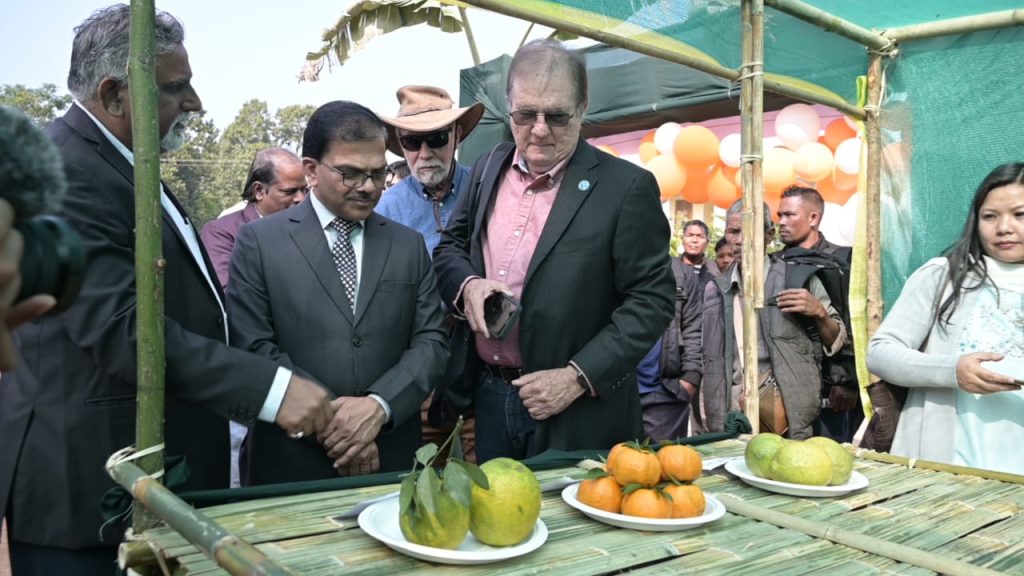Tura, Dec 11: In efforts to showcase the rich citrus biodiversity of Garo Hills region of Meghalaya and also to make the farmers aware about the germplasm conservation, the Dept. of Horticulture, NEHU, Tura Campus along with ICAR-NBPGR, New Delhi organised a capacity building programme for farmers on ‘Citrus Biodiversity Fair and PGR Conservation Awareness’ on Monday.

The capacity building programme for farmers was organized under NEH scheme under the theme ‘Viksit Bharat@2047’. A team of senior and renowned International Scientists from USA and France also participated in the programme.
Garo Hills is considered as a natural home of many citrus species and there is a vast diversity in both wild and cultivated forms. Varieties such as chambil, kakgzi, jambura grow abundantly in the region. Also, several local varieties such as slonga, chamba, kampil are yet to be identified scientifically. These wild and semi-wild species of Citrus have immense socio-economic, cultural, religious and medicinal value, besides being important sources for agronomic traits.

Dr. Subarna Hajong, Scientist, ICAR-NBPGR, Umiam gave an insightful information to the farmers on the role of National Bureau of Plant Genetic Resources (NBPGR) in conservation of plant genetic resources. The indigenous Citrus species of India—mainly Northeast India—have distinctive and valuable genetic traits, such as resistance to biotic and abiotic stress, distinctive aroma, flavor, etc. and there is a need for awareness and understanding among the citrus-producing regions for the exploitation of biodiversity and the conservation of citrus for sustainable development and bioprospecting as stated by Fred Gmitter, Jr. Professor, University of Florida, USA.

Speaking at the function, Prof Sujatha Gurudev, Campus Director, NEHU Tura campus urged the farming community to strive forward and make sure that the region progresses under their active participation.
Speaking as the chief guest, NEHU Vice Chancellor, Prof. P.S. Shukla, emphasized on the richness of the NE region and the need of the hour for creating a good quality planting material for improving the productivity in the region.

The programme was attended by 100 farmers involved in citrus farming from three districts of Garo hills including East, West and South Garo Hills.
Citrus fruits found in the region are needed to be protected, either at natural habitat or through concerted conservation programme. There is a threat of gradual erosion of citrus species and citrus germplasm base. In future, there is every possibility and chance that some of the species in the region will become completely extinct. Conservation of germplasm is important because many species are becoming extinct and many others are threatened and endangered.

To encourage the farmers involved in citrus farming, an input distribution programme comprising of citrus saplings, secateur, spathe, vermicomposting beds, bag packs and maize shellers were distributed to all the farmers to boost the production of citrus in the region under the NEH scheme of ICAR. The programme was followed by an open scientist-farmers interaction to address the problems of farmers.
Also Read: Deputy CM Tynsong slams VPP for playing politics in Them Iew Mawlong relocation Issue
Also Watch
Find latest news from every corner of Northeast India at hubnetwork.in, your online source for breaking news, video coverage.
Also, Follow us on-
Twitter-twitter.com/nemediahub
Youtube channel- www.youtube.com/@NortheastMediaHub2020
Instagram- www.instagram.com/nemediahub



